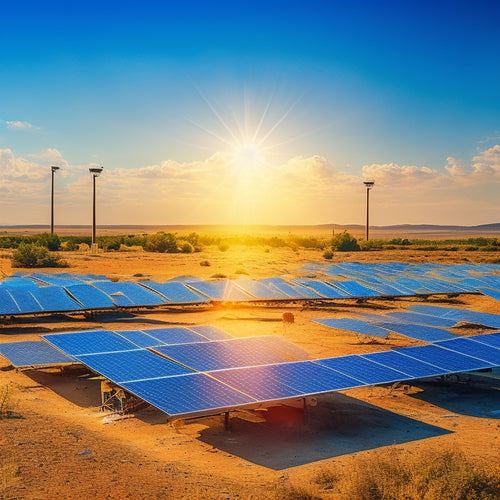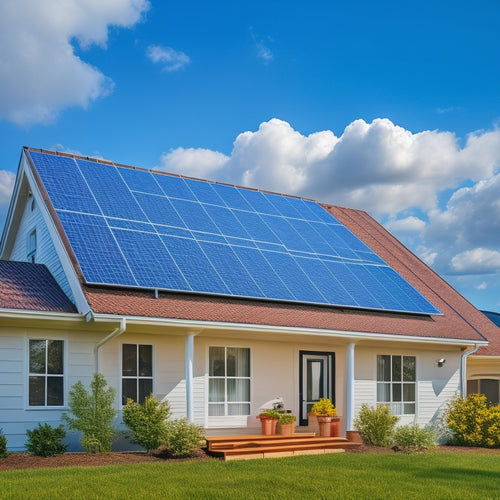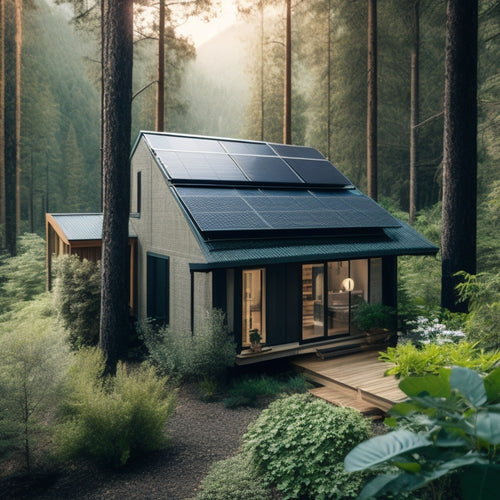
Off Grid Battery System
Share
You're looking for a dependable off-grid battery system to power your home or cabin during outages and extended periods of darkness. Off-grid systems provide energy independence and reduce reliance on fossil fuels, contributing to a cleaner energy future. When selecting a battery type, consider factors like depth of discharge, cycle life, and temperature range to guarantee peak performance and reliability. Assess your energy needs by calculating your total daily energy consumption in watt-hours to determine the required Ah rating for your batteries. With the right system design and maintenance practices, you can enjoy a reliable and sustainable power supply - and there's more to investigate to guarantee you get it just right.
The Essentials
- Off-grid battery systems provide reliable backup power during outages and maintain energy supply during extended periods of darkness.
- The type of energy storage solution chosen (e.g., deep cycle, lithium-ion, flow batteries) impacts system performance, reliability, and cost.
- Effective battery design and configuration, including series and parallel connections, are crucial for optimal system operation and voltage balancing.
- Regular maintenance practices, such as monitoring voltage and state of charge, are essential to extend battery lifespan and prevent unexpected outages.
- Accurate assessment of energy needs and calculation of required battery capacity are vital to ensure a steady power supply and optimal system performance.
Reliable Power in Darkness
When the grid goes dark, you need a reliable power source to keep your essentials running. That's where energy storage solutions come in, providing a seamless shift to backup power when the lights go out.
A reliable battery backup for home ensures uninterrupted energy supply and keeps critical home systems, such as refrigeration and lighting, functioning smoothly.
With a well-designed off-grid battery system, you can count on having power in dark times.
Power in Dark Times
Across extended periods of darkness, your off-grid battery system becomes the sole guardian of your power needs, and its reliability is vital.
You've made the conscious decision to break free from the grid, and now it's important to guarantee your system can deliver when the sun doesn't shine. Solar integration is key, but it's only as good as the backup power it provides.
With a reliable source of backup power during outages, you can say goodbye to the inconvenience of lost productivity, spoiled food, and compromised safety. Regular system maintenance is necessary to prevent unexpected outages, and load management strategies will help you prioritize your energy usage.
When comparing your off-grid setup to the traditional grid, remember that energy independence comes with its own set of challenges. Safety considerations, such as proper battery ventilation and electrical protection, can't be overlooked.
Budget constraints may have influenced your system design, but don't compromise on vital components. Weather impacts, like extreme temperatures or prolonged darkness, must be factored into your system's design.
Fortunately, technology advancements have made off-grid battery systems more efficient and affordable, giving you the freedom to live life on your own terms.
Energy Storage Solutions
In the darkest moments, your off-grid battery system's energy storage solutions stand as the key component of your power reliability. When the sun doesn't shine, and the grid is down, you need a strong energy storage system to keep your lights on and your devices running. You've invested in solar integration to utilize renewable energy, but it's your energy storage solutions that guarantee you can use that energy when you need it.
| Energy Storage Solution | Key Benefits |
|---|---|
| Deep Cycle Batteries | High energy efficiency, long lifespan, and low maintenance |
| Lithium-Ion Batteries | High energy density, fast charging, and scalable design |
| Flow Batteries | Long-duration energy storage, low cost, and flexible design |
| Lead-Acid Batteries | Cost-effective, well-established technology, and easy maintenance |
| Flywheel Energy Storage | High power density, rapid response, and low maintenance |
When selecting an energy storage solution, consider factors like cost analysis, system scalability, and inverter selection. Proper battery maintenance and load management are also essential to guaranteeing your off-grid battery system operates at peak performance. With the right energy storage solutions, you can enjoy the off-grid advantages of renewable energy sources and backup options, giving you the freedom to live life on your own terms.
Reduced Carbon Footprint Guaranteed
You're making a conscious choice to reduce your reliance on fossil fuels and shift to a cleaner, more sustainable energy source with your off-grid battery system.
By utilizing photovoltaic cells, you can capture renewable energy from sunlight and store it for later use. This not only reduces your carbon footprint but also decreases your dependence on the grid.
By doing so, you'll markedly lower your emissions today and pave the way for a cleaner energy future.
With clean energy now a reality, you'll be playing a vital role in mitigating the impact of climate change.
Lower Emissions Today
With a growing awareness of climate change, reducing your carbon footprint has become an urgent priority, and off-grid battery systems are leading the charge.
You're taking a vital step towards a cleaner, greener future by adopting sustainable practices that minimize environmental impact. By utilizing renewable resources like solar and wind power, you're reducing your reliance on fossil fuels and lowering emissions.
As you shift to off-grid living, you can also investigate alternative energy solutions like Photovoltaic panels and deep cycle batteries to further minimize your carbon footprint. Off-grid battery systems integrate seamlessly with eco-friendly technologies, ensuring energy efficiency and conservation. This collaboration enables you to achieve carbon neutrality, making a significant dent in the fight against climate change.
As you commence on this expedition towards sustainable living, you'll find that off-grid battery systems are designed to optimize energy storage and release. This means you can enjoy uninterrupted power supply while minimizing your carbon footprint.
Clean technologies and green innovations are at the heart of these systems, ensuring that you're not only reducing emissions but also promoting a healthier planet. By choosing an off-grid battery system, you're taking a proactive step towards a cleaner, more sustainable tomorrow.
Clean Energy Now
Embracing clean energy solutions is essential to reducing your carbon footprint, and off-grid battery systems are at the forefront of this movement. By integrating solar power into your energy mix, you're taking a significant step towards energy independence and reducing your reliance on fossil fuels.
Renewable resources like solar energy offer a sustainable alternative to traditional grid power, minimizing your environmental impact and promoting eco-friendly practices.
Off-grid battery systems enable you to store excess energy generated by your solar panels, providing power autonomy and reducing your energy bills. With energy efficiency at its core, these systems optimize your energy usage, ensuring you get the most out of your renewable resources.
By adopting off-grid solutions, you're not only reducing your carbon footprint but also gaining independence from the grid. This means you're no longer tied to the whims of utility companies, and you can enjoy the freedom to live life on your own terms.
With clean energy now, you're taking a significant step towards a sustainable future, and off-grid battery systems are the key to revealing it.
Deep Cycle Battery Design
When designing your off-grid battery system, you'll need to select the right battery type, considering factors like depth of discharge, cycle life, and temperature range.
For instance, deep cycle batteries are ideal for off-grid systems as they can handle renewable energy solutions and provide a reliable power backup.
You'll also need to decide on a cell configuration that meets your system's voltage and capacity requirements, whether that's a series, parallel, or series-parallel setup.
Battery Type Selection
Selecting the right battery type is an essential step in designing an off-grid battery system, as it directly impacts the overall performance, reliability, and cost of the system.
You'll need to take into account factors like lithium advantages, such as high energy density and long lifetimes, versus lead acid comparison, which may be more affordable upfront but require more maintenance.
Battery maintenance itself is a fundamental aspect, as some types require regular watering and equalization, while others are virtually maintenance-free.
Cost considerations will also play a significant role, as lithium batteries tend to be more expensive than lead acid, but offer longer lifetimes.
Size limitations are another important factor, as you'll need to guarantee your chosen battery fits within your available space.
Additionally, reflect on the environmental impact of your choice, as well as safety features like thermal runaway protection and installation tips, such as proper ventilation and grounding.
Finally, think about charging options and discharge rates, as these will affect the overall efficiency and performance of your off-grid system.
Cell Configuration Options
Your deep cycle battery design depends on the cell configuration you choose, which greatly impacts the overall performance and functionality of your off-grid system.
When selecting cell types, take into account configuration strategies that meet your energy needs. Series connections increase voltage, while parallel connections enhance capacity. A mix of both strategies can optimize performance metrics.
To guarantee voltage balancing, use identical cells with similar capacities and internal resistances.
Capacity optimization is essential, as it affects the overall system efficiency. You'll want to reflect on installation tips, such as keeping cells in a well-ventilated area and avoiding extreme temperatures.
Regular maintenance practices, like monitoring voltage and state of charge, are important to extend the lifespan of your cells.
Safety considerations, such as proper electrical connections and protective gear, are also fundamental.
Consider Ah Rating First
When selecting an off-grid battery system, you'll want to take into account the Ah rating first, as it directly impacts the battery's capacity to store energy.
Battery capacity matters, and it's crucial to calculate your needs accurately to guarantee you're getting the right system for your off-grid setup.
For instance, a deep cycle solar battery like Renogy can provide reliable energy storage for your home.
You can investigate different lithium-ion options to find the best fit for your needs.
You'll need to determine how much energy you require to power your appliances and devices during the day and night.
Battery Capacity Matters
Most off-grid systems require a substantial amount of energy storage to secure a steady power supply during periods of low renewable energy input. When selecting a battery for your off-grid system, you'll want to take into account the capacity that suits your needs.
It's vital to prioritize the Ah rating, as it directly impacts the overall performance of your system. A higher Ah rating translates to more energy storage, allowing you to power your appliances for an extended period.
However, it's important to balance capacity with other factors like battery efficiency and power density. A battery with high power density can deliver more power relative to its size and weight, making it ideal for off-grid systems where space is limited.
On the other hand, high battery efficiency guarantees that you get the most out of your stored energy, reducing waste and increasing the overall effectiveness of your system.
Calculate Your Needs
To determine the ideal battery capacity for your off-grid system, start by calculating your energy needs.
You'll need to assess your energy consumption and usage patterns to determine how much power you require daily. Begin by identifying the devices you plan to power, including lights, refrigerators, computers, and appliances, and their corresponding wattage ratings.
Next, calculate the total daily energy consumption in watt-hours (Wh) by multiplying each device's wattage by the number of hours it's used daily.
Consider your energy usage patterns, too. Do you use more energy during the day or night? Are there specific times when you require more power?
By understanding your energy needs, you can determine the required Ah (ampere-hour) rating for your batteries. A higher Ah rating means more energy storage capacity, but it also increases the system's cost and size.
Longer Cycle Life Guaranteed
You'll want to verify your off-grid battery system's lifespan meets your expectations, and that's where understanding cycle life comes in.
A battery's cycle life refers to the number of charge and discharge cycles it can handle before its capacity drops to 80% of its initial value.
You should look for a system that assures a minimum of 3,000 to 5,000 cycles, depending on your specific needs and usage patterns.
Battery Lifespan Expectations
Your off-grid battery system's lifespan is a critical factor in determining its overall performance and reliability. A well-maintained battery system can provide you with years of trouble-free service, while a neglected one can leave you stranded without power.
When it comes to battery lifespan expectations, you should aim for a minimum of 10 years, with some high-quality batteries lasting up to 20 years or more.
Proper battery maintenance and charging techniques play a significant role in extending the lifespan of your off-grid battery system. You should regularly check the electrolyte levels, clean the terminals, and verify the batteries are charged correctly.
Avoid overcharging or undercharging, as this can reduce the battery's lifespan. By following these best practices, you can enjoy a longer cycle life and minimize the need for premature replacements.
Frequently Asked Questions
Can Off-Grid Battery Systems Be Used for Residential Purposes?
You can achieve energy independence and sustainable living by utilizing renewable energy sources, and yes, you can use off-grid battery systems for residential purposes, storing excess energy for later use, reducing reliance on the grid.
Are Off-Grid Battery Systems Compatible With Existing Grid Infrastructure?
"When in Rome, do as the Romans do," but what if you want to break free from the grid? You're wondering if you can utilize grid independence with existing infrastructure. The answer is yes, with energy storage systems seamlessly integrating with the grid, you can enjoy autonomy without disconnecting completely.
How Often Should Off-Grid Battery Systems Be Maintained?
To maximize your battery lifespan, you'll want to perform routine maintenance every 3-6 months, checking electrolyte levels, cleaning terminals, and ensuring proper charging, as inconsistent maintenance frequency can lead to premature degradation.
Can I Use Off-Grid Battery Systems for Backup Power Only?
Like a sleeping giant, backup power lies dormant, waiting to release its fury when the grid fails. You can utilize this beast by sizing your system correctly and choosing the right charging methods, ensuring seamless backup power when you need it most.
Are Off-Grid Battery Systems More Expensive Than Traditional Energy Sources?
When comparing costs, you'll find that traditional energy sources like grid-tied electricity and generators are often cheaper upfront, but you're sacrificing energy independence; off-grid battery systems, though pricier, offer long-term freedom and autonomy.
Final Thoughts
As you flip the switch, the lights flicker on, casting a warm glow in the darkness. Your off-grid battery system hums quietly in the background, a reliable heartbeat of power in the midst of uncertainty. With a reduced carbon footprint and deep cycle design, you can breathe easy knowing you've made a sustainable choice. And when the grid fails, your Ah-rated batteries will keep you going, their longer cycle life a signal of hope in the dark.
Related Posts
-

What Happens Without a Charge Controller in Solar Panels
Without a charge controller in your solar panel system, you risk overheating batteries due to overcharging, which can...
-

Cost of Solar Panel Installation
You can expect to pay between $15,000 and $30,000 or more for a typical solar panel installation, depending on the sy...
-

Off Grid Solar Batteries
As you shift to off-grid living, you'll rely on high-performance solar batteries to store excess energy generated by ...


